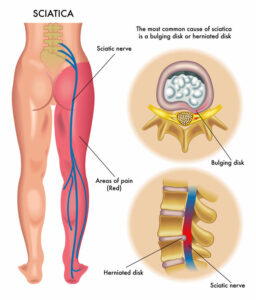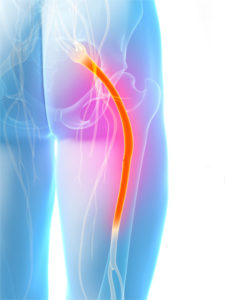Sciatica, so-called because it involves the sciatic nerve, is a common cause of lower back pain. The sciatic nerve is actually a group of nerves bound in one nerve sheath, running from the lower back through the buttocks and thigh to the knee, then branching on down into the foot. It is the longest nerve in the body. So, besides pain deep in the buttock, an irritated sciatic nerve may also produce a wide range of other symptoms, including pain in the thigh that may radiate all the way down to the feet and include weakness, tingling, and numbness in the legs.
 WHAT CAUSES SCIATICA?
WHAT CAUSES SCIATICA?
This condition occurs as the result of irritation to the sciatic nerve or when the nerve becomes pinched. Some common causes include work that requires repetitive lifting or constant exposure to mechanical vibrations, including long periods behind the wheel of a car or truck. In some instances, car accidents can cause sciatica, too.
Though poor posture and inactivity are not known to cause sciatica, strong abdominal and back muscles which can be developed through exercise can help keep your back healthy. A regular exercise routine might be particularly important if your job puts you at risk for back pain.
Unfortunately, you can’t always predict who will suffer from sciatica based on these risk factors. Often, a person who never lifts anything will suffer a sudden attack for no apparent reason. There have even been cases where someone experienced a case of sciatica after simply sneezing!
WHAT MAKES SCIATICA HURT?
Some experts blame herniated discs. Discs are the fibrous pads between the vertebrae that make up the spine. When a disc herniates, it bulges and can press on the sciatic nerve. Degenerative disc disease could also play a role. Other researchers blame the piriformis muscle in the buttocks. An important part of the musculoskeletal system, it is the muscle that allows you to lift your leg sideways. If inflamed by injury or overexertion, the piriformis muscle can press against the sciatic nerve. Thus, there are many possible causes of this painful condition. In most cases, an exact diagnosis may not be necessary.
SCIATICA AND CHIROPRACTIC CARE

Many cases of Sciatica respond well to simple treatment options, including exercise, modification of activities, and conservative care such as chiropractic adjustments, physical therapy, and spinal
rehabilitation. Over-the-counter pain medications and bed rest also provide relief for many people.
Only a very small percentage of cases require more invasive procedures such as surgery. Most cases of sciatica will respond to such chiropractic treatments within a short amount of time.
If you are experiencing leg pain or tingling, low back pain, or any other symptoms that are leading you to believe that you may be suffering from sciatica, contact our office today.
In less than 30 minutes, you will receive a Complete Sciatica Consultation from our Denver Chiropractor who will prescribe the appropriate chiropractic treatments to correct the problem and
provide relief from your symptoms.
Our Chiropractic office is conveniently located in Denver, Colorado near I-25 & S. Bellaire St.
